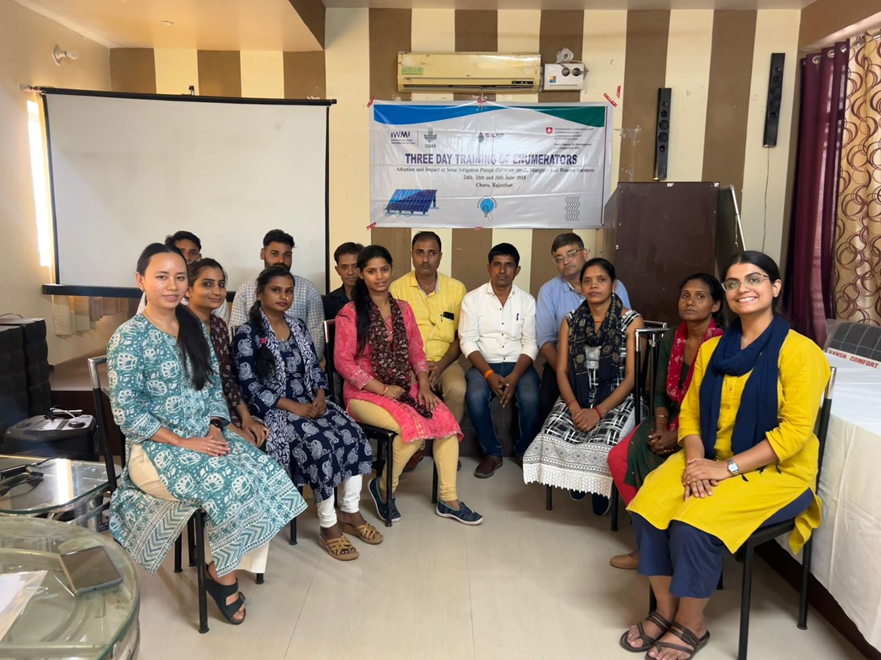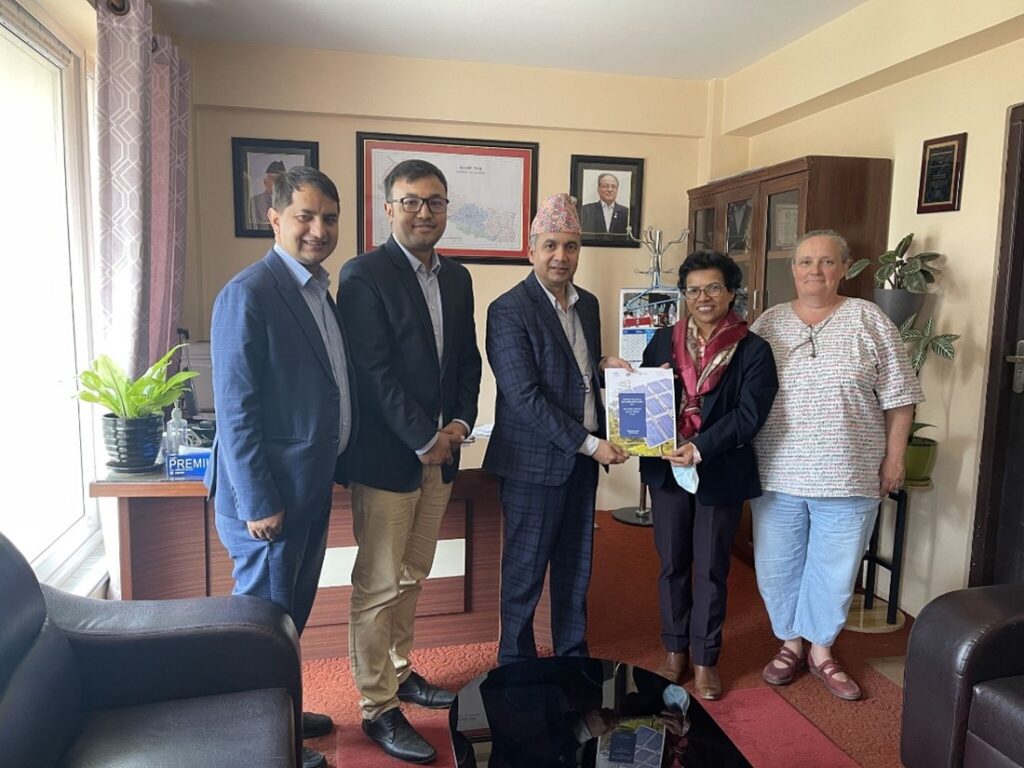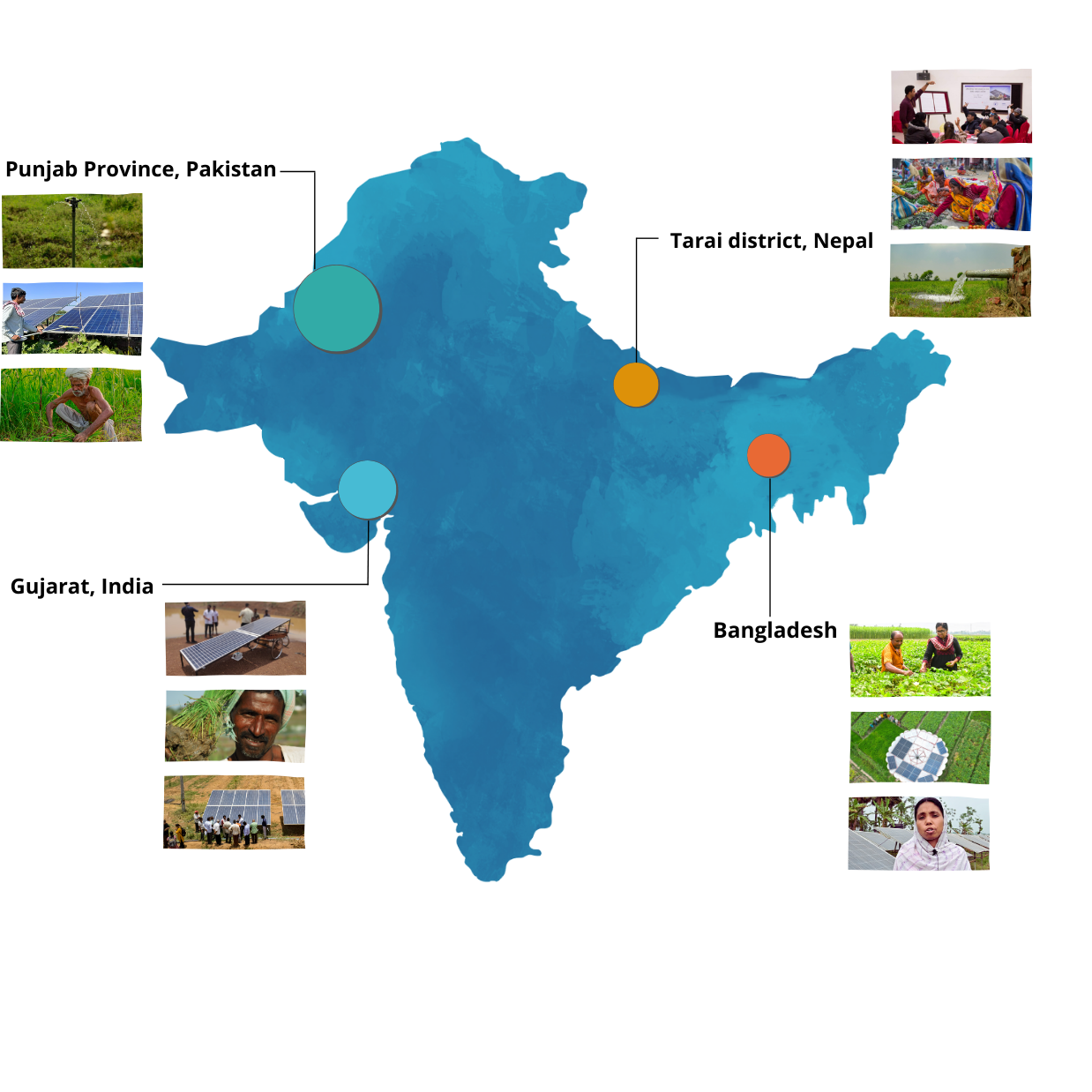Training of Data Enumerators for PM Kusum (B) Scheme in Rajasthan
Empowering Marginal and Women Farmers: Key Insights from June 2024 GESI and SoLAR Studies in Bangladesh
Inauguration of Solar Pump in Chimkatola, Madhya Pradesh
IWMI team visits the Gazi Grid Integration Pilot Site in Dinajpur, Bangladesh
Visit to the newly appointed Executive Director (ED) of Alternative Energy Promotion Centre (AEPC) in Kathmandu, Nepal to handover the manual in the field

Training of Data Enumerators for PM Kusum (B) Scheme in Rajasthan
From June 24-26, 2024, a 3-day training was organized in Churu, Rajasthan, to collect data for the study “Adoption and Impact of Solar Irrigation Pumps (SIPs) on Small, marginal, and women farmers: A Case of PM KUSUM B in Rajasthan”. Separate FGDs were conducted with both female and male enumerators…

Empowering Marginal and Women Farmers: Key Insights from June 2024 GESI and SoLAR Studies in Bangladesh
From June 3rd to 11th, 2024, a comprehensive study was conducted in Bangladesh as part of the GESI and SoLAR initiatives, focusing on solar-powered irrigation pumps (SIPs) to bridge gender disparities in energy access. This study involved 10 Focus Group Discussions (FGDs) across Khulna, Jessore, Barishal, and Bogura, engaging 50…
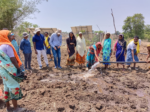
Inauguration of Solar Pump in Chimkatola, Madhya Pradesh
Solar pump was inaugurated by Alok Sikka at Chimkatola, Narayanganj, Mandla, Madhya Pradesh, India as a part of SDC-SoLAR project and Agroecology initiative. SIP (Solar Irrigation Pump) has been installed in the village, where 13 female farmers have formed a Water User Group (WUG) to operate the system. The SIP…

IWMI team visits the Gazi Grid Integration Pilot Site in Dinajpur, Bangladesh
Dr. Marie-Charlotte Buisson and Archisman Mitra visited the Grid integration pilot site done by Gazi in Dinajpur, Bangladesh from June 17th to 27th June. Also, Archisman Mitra visited the grid integration site of WAVE in the Kushtia region and interacted with BREL officials who will be starting a new grid…

Visit to the newly appointed Executive Director (ED) of Alternative Energy Promotion Centre (AEPC) in Kathmandu, Nepal to handover the manual in the field
Photo: (left to right) – Dr. Laxman Prasad Ghimire (AEPC), Shisher Shrestha (IWMI), Nawa Raj Dhakal (AEPC), Dr. Manohara Khadka (IWMI), Dr. Marlene Buchy (IWMI) On 18 May 2023, Dr. Manohara Khadka, Country Representative, Nepal, Dr. Marlene Buchy, Senior Researcher, IWMI Nepal and Shisher Shrestha, Country Lead, SoLAR-SA, IWMI Nepal…
Nepal Delegation’s Exposure Visit to India on Solar Irrigation
 From June 17-21, 2024, researchers from Nepal including Shisher visited Bihar to observe water entrepreneurship model with solar irrigations that could be replicated in Nepal.
From June 17-21, 2024, researchers from Nepal including Shisher visited Bihar to observe water entrepreneurship model with solar irrigations that could be replicated in Nepal.
IWMI team visit to Grid-integrated SIP Pilots in Dinajpur
The IWMI team visited village Boro Bochopukar in Dinajpur district to see the grid integration of solar irrigation pump (pilot project) on March 7 and 8, 2024. These are implemented and operated by Gazi Renewable Energy Company Ltd. and financed by GRECL and IDCOL. The team observations regarding the SIP unit were that (i) the connection of 3 SIP units was done to the main (4th) SIP grid unit and (ii) in instances where harvesting was taking place, the SIP unit successfully supplied energy to the Grid. The interaction with farmers made us understand that there was considerable reduction of diesel pumps in the SIP command area and apart from decrease in irrigation rates, farmers reported co-benefits arising from the SIP, such as ease of irrigation and timely availability. It was also observed that in regions where there is no considerable difference in irrigation rates between SIP and diesel, farmers favored SIP, citing co-benefits.
SIP sites visit to understand gender and social inclusion
 From February 19th to 22nd, 2024, the IWMI GESI consultant visited various IDCOL fee-for-service model SIP sites in North-west Bangladesh. Observations revealed that male farmers had diversified livelihoods, leading women to be responsible for operating the SIPs. At the BADC-LLP site, which featured smaller SIPs, the water fee was 3000 taka per acre. At the GAZI 2 Grid Pilot site, the socio-economic status of the farmers was higher, resulting in fewer women farmers working in the fields. At the GAZI 2 Model SIP site, the fenced SIP area was used for livestock rearing (chickens and ducks), however, benefiting only the landowner/operator. At the BMDA dug well, farmers cultivated vegetables, and women have been observed to be more involved in vegetable farming, making it a potential site for distributing SIPs to women.
From February 19th to 22nd, 2024, the IWMI GESI consultant visited various IDCOL fee-for-service model SIP sites in North-west Bangladesh. Observations revealed that male farmers had diversified livelihoods, leading women to be responsible for operating the SIPs. At the BADC-LLP site, which featured smaller SIPs, the water fee was 3000 taka per acre. At the GAZI 2 Grid Pilot site, the socio-economic status of the farmers was higher, resulting in fewer women farmers working in the fields. At the GAZI 2 Model SIP site, the fenced SIP area was used for livestock rearing (chickens and ducks), however, benefiting only the landowner/operator. At the BMDA dug well, farmers cultivated vegetables, and women have been observed to be more involved in vegetable farming, making it a potential site for distributing SIPs to women.
Field Visit to Mandla, Madhya Pradesh for site identification
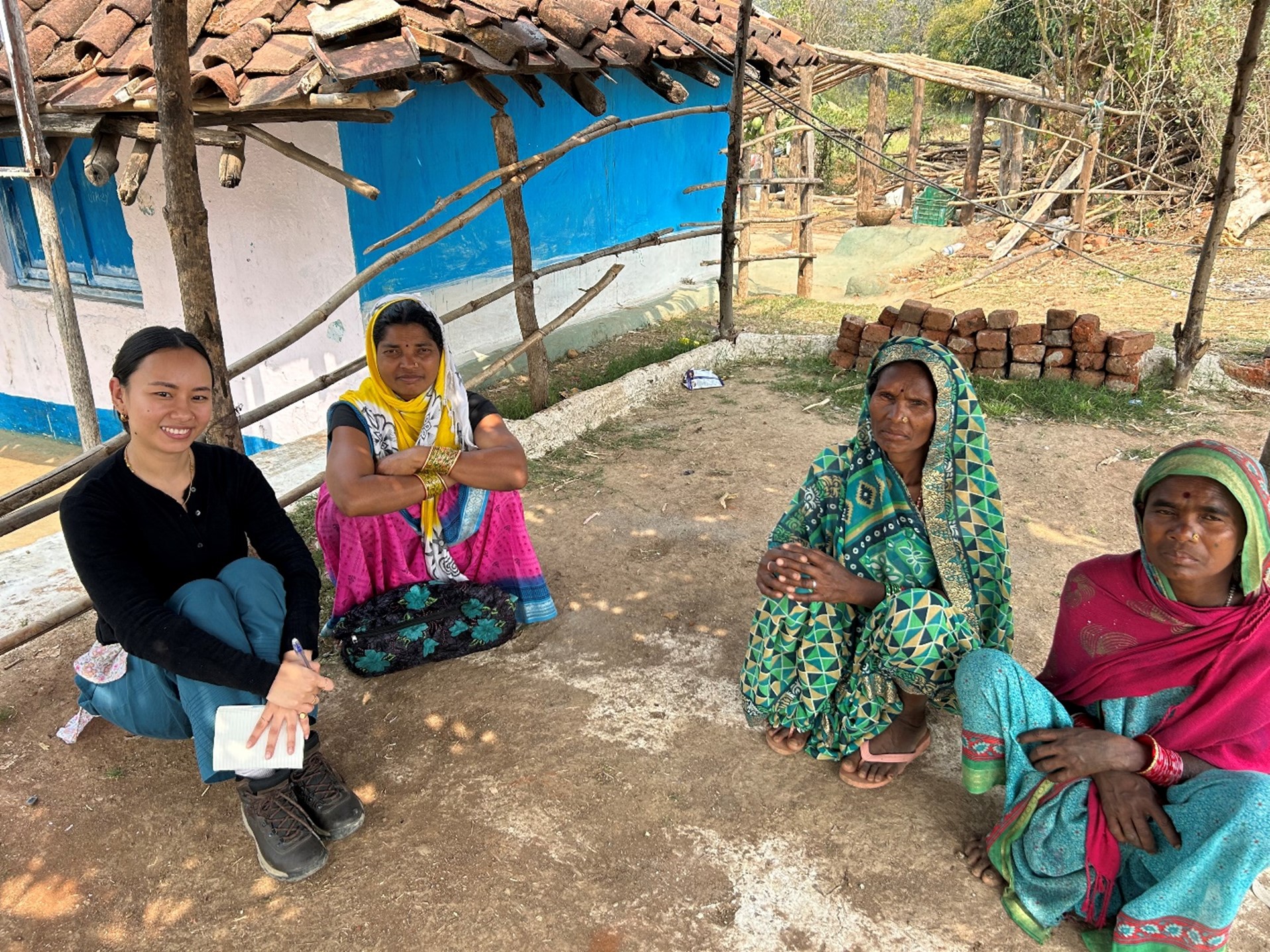 In collaboration with One CGIAR agro-ecology initiative, field visit to Mandla district of Madhya Pradesh took place from 12th February to 16th February 2024, which included discussion with the implementation partner, PRADAN for site identification for interventions targeting women farmers. Preliminary discussion took place with women of Kondra village who are at the forefront of vegetable farming and farm produce selling activities to identify community needs to lead evidence-based planning for intervention.
In collaboration with One CGIAR agro-ecology initiative, field visit to Mandla district of Madhya Pradesh took place from 12th February to 16th February 2024, which included discussion with the implementation partner, PRADAN for site identification for interventions targeting women farmers. Preliminary discussion took place with women of Kondra village who are at the forefront of vegetable farming and farm produce selling activities to identify community needs to lead evidence-based planning for intervention.
Bangladesh field visit for Grid-integration of SIP Sites Monitoring

IWMI SoLAR team accompanied by IDCOL and NGO Forum representatives
A team constituting researchers from IWMI, IDCOL and NGO Forum visited SIP grid integration site in Chepuri Kandor, Kajol Porchim, Bochapukur and Balakandor from 7th March to 9th March 2024. This visit’s objective was to check the status of the grid-connected sites and gather more data. It was also an attempt to check the different issues in the grid-connected SIPs such as O&M of the SIP, loadshedding in the area, water meter readings, energy meter readings and transformer theft issues. It was observed that Trackso didn’t install the updated data logger to get data from the pump controller as promised. This needed to be prioritized. Also, historical data on the four grid-connected sites has not been provided. Only two sites from GAZI have historical data in the Trackso portal. However, historical information from the inverter over the local WIFI accessing the communication module of the inverter could be retrieved. Hence, if the TRACSO can communicate with the inverter, historical data from the inverter can be retrieved. The sponsors’ water and energy sales data would be helpful for the analysis. A spec sheet of the equipment used for grid integration would be useful.
Capacity building session to female farmers on SIP techniques at Zahid Farm, Chakri, Punjab, Pakistan
 IWMI Pakistan in collaboration with CEWRI organized the training of female farmers on 22 February 2024 at Zahid Farm, Chakri, Punjab. The goal of the training was to equip aspiring women farmers with the expertise and abilities to adopt advanced farming practices powered by solar energy. This encompasses the utilization of high-efficiency irrigation systems and solar irrigation techniques, as well as the promotion of kitchen gardening.Forty three participants attended the training sessions.
IWMI Pakistan in collaboration with CEWRI organized the training of female farmers on 22 February 2024 at Zahid Farm, Chakri, Punjab. The goal of the training was to equip aspiring women farmers with the expertise and abilities to adopt advanced farming practices powered by solar energy. This encompasses the utilization of high-efficiency irrigation systems and solar irrigation techniques, as well as the promotion of kitchen gardening.Forty three participants attended the training sessions.
Capacity building session to male farmers on SIP techniques at Ubaid Farm, Balkasar, Punjab, Pakistan
 International Water Management Institute (IWMI), Pakistan in collaboration with Climate Energy Water Research Institute (CEWRI) organized the training of male farmers on 21 February 2024 at Ubaid Farms Balkasar Punjab, Pakistan. The goal of the training was to empower potential farmers with the knowledge and skills necessary to implement innovative agricultural techniques, and usage of solar operated irrigation techniques, resulting in increased crop productivity, sustainability, and economic well-being. Thirty-five participants attended the training sessions having agricultural backgrounds that worked on the farm or were potential farmers.
International Water Management Institute (IWMI), Pakistan in collaboration with Climate Energy Water Research Institute (CEWRI) organized the training of male farmers on 21 February 2024 at Ubaid Farms Balkasar Punjab, Pakistan. The goal of the training was to empower potential farmers with the knowledge and skills necessary to implement innovative agricultural techniques, and usage of solar operated irrigation techniques, resulting in increased crop productivity, sustainability, and economic well-being. Thirty-five participants attended the training sessions having agricultural backgrounds that worked on the farm or were potential farmers.
Training of Water Professionals – National Agriculture Research Centre (NARC), Islamabad
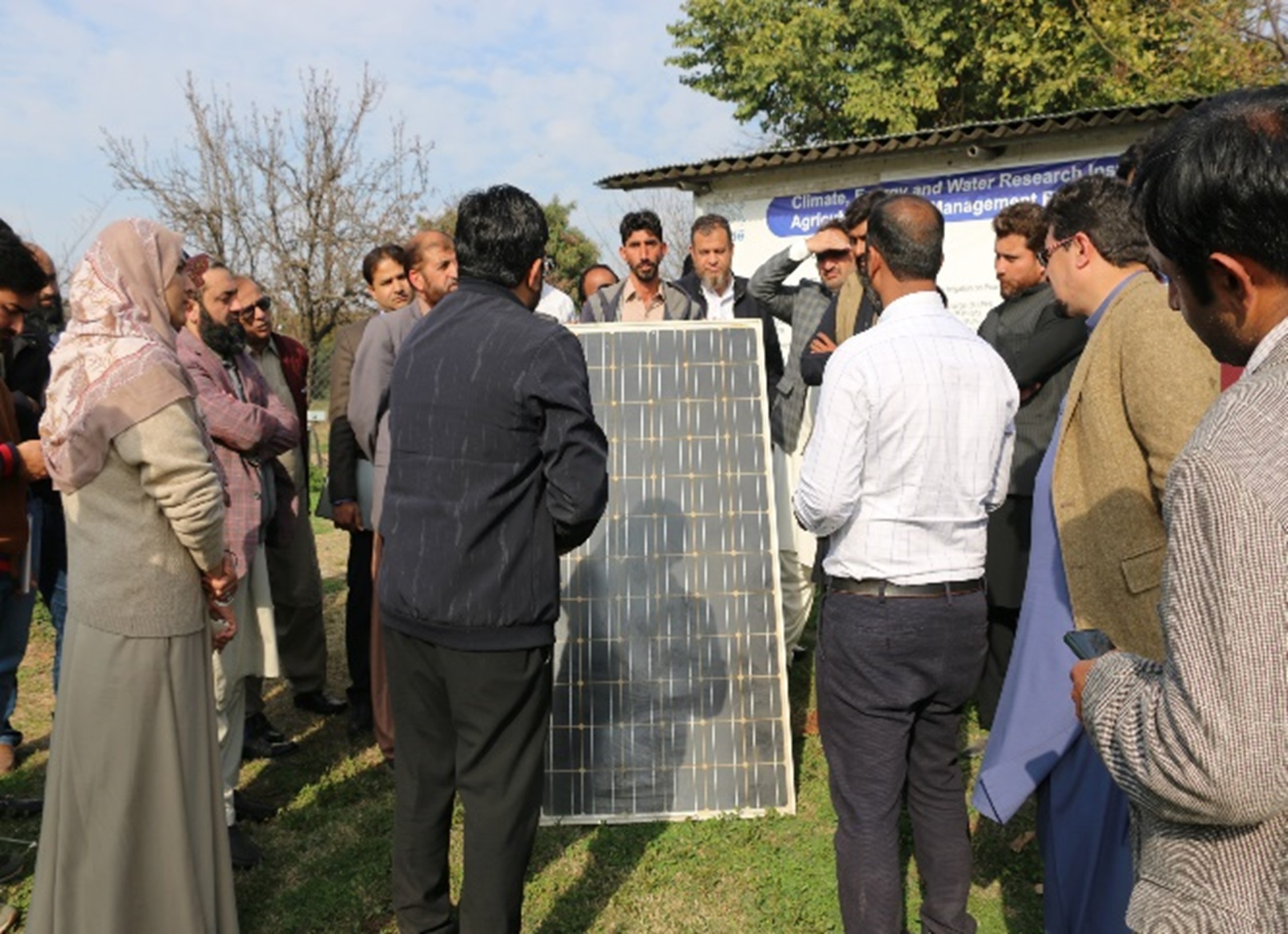 IWMI Pakistan in collaboration with CEWRI organized the training of water professionals titled ‘Solar Pumping Integrated with High Efficiency Irrigation Systems to Increase Water-Land use Efficiency.’ The training was focused on the design, implementation, and optimization of solar pumping integrated with high-efficiency irrigation systems. In addition to this, appropriate site selection for solar pump installation, selection of appropriate components including solar panels, pumps, controllers, and storage systems was covered in the training. Moreover, the training included presentations, group activities, and field demonstrations.
IWMI Pakistan in collaboration with CEWRI organized the training of water professionals titled ‘Solar Pumping Integrated with High Efficiency Irrigation Systems to Increase Water-Land use Efficiency.’ The training was focused on the design, implementation, and optimization of solar pumping integrated with high-efficiency irrigation systems. In addition to this, appropriate site selection for solar pump installation, selection of appropriate components including solar panels, pumps, controllers, and storage systems was covered in the training. Moreover, the training included presentations, group activities, and field demonstrations.
This was a two-day training held at National Agriculture Research Council (NARC) at Islamabad, Pakistan on 26 and 27 February 2023. Thirty participants with backgrounds in agricultural engineering from Agriculture department and NARC from all provinces of Pakistan attended the training sessions.
Water professionals appreciated that training topics were closely related to the ongoing projects of their respective departments. They also highlighted that they would seek technical guidance from the PARC trainers in future to fulfil their professional duties in a technically sound manner.Water professionals expressed their desire to attend trainings, in future, related to designing of high efficiency irrigation system coupled with solar systems at larger scale and in different ecological zones.
Interaction with farmers in Gujarat, India
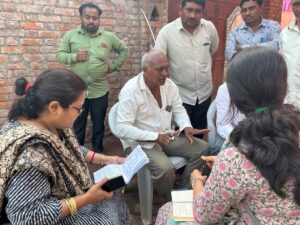
Discussions with farmers in Botad, Gujarat
Field visits to Anand and Botad districts of Gujarat took place from 28th November to 1st December 2023 and involved one-on-one interaction with female farmers, SKY, and non-SKY male farmers to get impact stories on the SKY scheme. A visit to the SKY training implementation partner Gujarat Energy Research and Management Institute (GERMI) in Gandhinagar was conducted to understand their experience of imparting the training. The results emphasized that female farmers highly valued access to daytime power. The improved time management resulting from this access was identified as a key factor contributing to a better quality of life for these women. This was a key benefit attributed to the SKY scheme. Read more: Impact of SKY A Perspective of Women Farmers
Discussions on pilot for KUSUM Mitra in Jaipur, India.
The country lead for India, Deepak Varshney visited Jaipur, Rajasthan, on 8-9 November 2023, to discuss the pilot to be conducted for energy extension agents or ‘KUSUM Mitra’ with Umesh Gupta, Additional Chief Engineer, Jaipur Vidyut Vitran Nigam Limited (JVVNL), Jaipur, Rajasthan and Danveer Singh, Deputy Director, Horticulture Department, Jaipur, Rajasthan. The meeting was held to facilitate wider adoption of SIPs. The implementation of off-grid SIPs and grid connected SIPs is slow in Rajasthan, 2000 SIPs against a target of 1.5 million under KUSUM C, and 2.75 lac against a target of 2 million under KUSUM B. The key constraint in the slow progress was owing to a lack of demand due to insufficient understanding about individual-level grid-connected SIPs. If KUSUM Mitra is successful in creating understanding and awareness of SIPs for individual-level grid-connected SIPs and off-grid SIPs to farmers, it has the potential to influence policies, not only in India but also in other regions planning large SIP schemes.
Capacity building training for farmers in the SoLAR grid-connected SIP pilot in Parsa, Nepal.
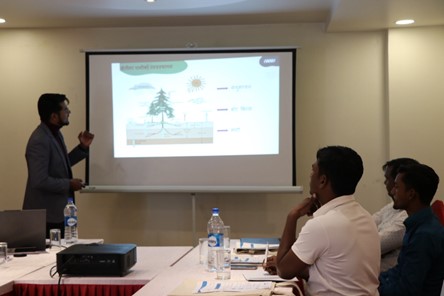
Capacity building training to JTA’s from SoLAR site in hotel Classic Plaza, Simara (Source: Amrita Rauniyar, IWMI-Consultant)
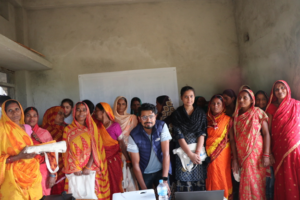
Group photo with male and female farmers after the completion of capacity building training
The IWMI team of Amrita Rauniyar, Tikaram Adhikari and Rakesh Shrestha visited Parsa, Chhipharmai-2 from November 5-7 to conduct capacity building training for farmers. Six major categories of training were provided to capacitate the farmers – agriculture water management training, modern vegetable farming training, insect and pest management training, seedbed preparation & seed treatment training along with field visits and technical training on SIPs operation and maintenance. The training duration varied from 30 minutes to 90 minutes. There were 19 male and 27 female participants in total. Based on the capacity and knowledge of farmers, a one pager dos and don’ts related to operating pumps and solar panels were provided to each farmer. Also, a Training of Trainers (ToT) session for the Junior Technical Assistants (JTAs) of the Rural Municipality on November 5, 2023, was organized to provide additional support for the capacity-building workshop.
Visit to Self Help Groups in Mandla, India.
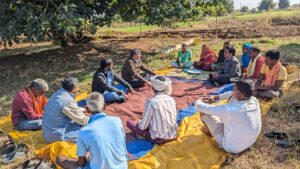 Focused group discussions with Self-Help-Groups (SHGs) were conducted in Mandla, Madhya Pradesh from 13-15 December 2023 to address challenges in the adoption of SIPs and mobilize its wider adoption through the Pay-Later Business Model. The model is planned to be implemented at the individual farmer-level and the SHG-level.
Focused group discussions with Self-Help-Groups (SHGs) were conducted in Mandla, Madhya Pradesh from 13-15 December 2023 to address challenges in the adoption of SIPs and mobilize its wider adoption through the Pay-Later Business Model. The model is planned to be implemented at the individual farmer-level and the SHG-level.
Operations and Maintenance of SIP training in Kohalpur, Banke by IWMI and Quasar, Nepal
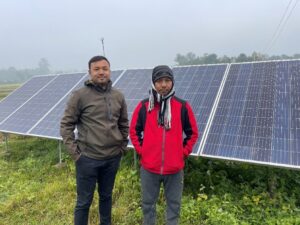
Kripal Chaudhary Is Chairperson Of One Of The User Communities, And Operated The Pumps For Two Sites
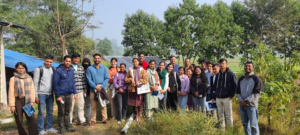
Participants Visiting Field 2 On Day 2 Of The Training
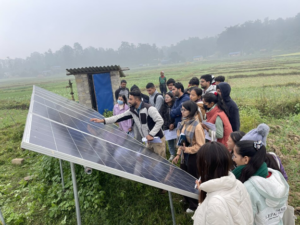
Participants Visiting Field 1 On Day 2 Of The Training
Shisher Shrestha and Anuj Mishra from IWMI, Siddhartha Shrestha (Training Coordinator) and Kushal Gautam (Trainer) from Quasar Energy Solutions, Pratiksha K.C. and Kapil Pudasaini from Alternative Energy Promotion Centre (AEPC) travelled to Kohalpur, Lumbini province to impart training on operations and maintenance of SIP on December 9-10, 2023. There was a total of 19 participants, 10 female and 9 males as well as two additional participants from AEPC who are young engineers working on the solar component. This training served as an introduction to the solar irrigation program. The SoLAR video documentary on solar irrigation was showcased to provide a background on the status of solar irrigation in Nepal, AEPC’s subsidy delivery mechanism, and highlight different challenges and opportunities of solar irrigation in Nepal. On day 2, a field visit was done to two SIP sites around 10 kms from the training venue, in Baijnath rural municipality.
Evaluation Team visit to Grid Integration sites in Bangladesh
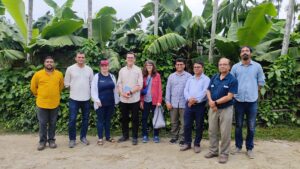
From left to right – Zahid Osmani, Ahsan Habib (NGO Forum), Irene Hofstetter (Swiss Development Corporation), Christopher Scott and team accompanied by Archisman Mitra (IWMI India)(Photo: IWMI)
Archisman Mitra facilitated and accompanied the evaluation team that included Dr. Wais Kabir, Stephanie Buechler, Praharsh Patel, Christopher Scott. The evaluation team held extensive meetings with IDCOL officials, various government officials and undertook field visits to see the grid integration sites, BADC and BMDA sites. The team observed that the recent announcement by the honourable Prime Minister of Bangladesh to replace all diesel pumps in Bangladesh with solar provides an important opportunity to support that transition with evidence-based policy design, building on research that has been undertaken in BD under the SoLAR project.
Evaluation team visit to Anand, Gujarat, India.
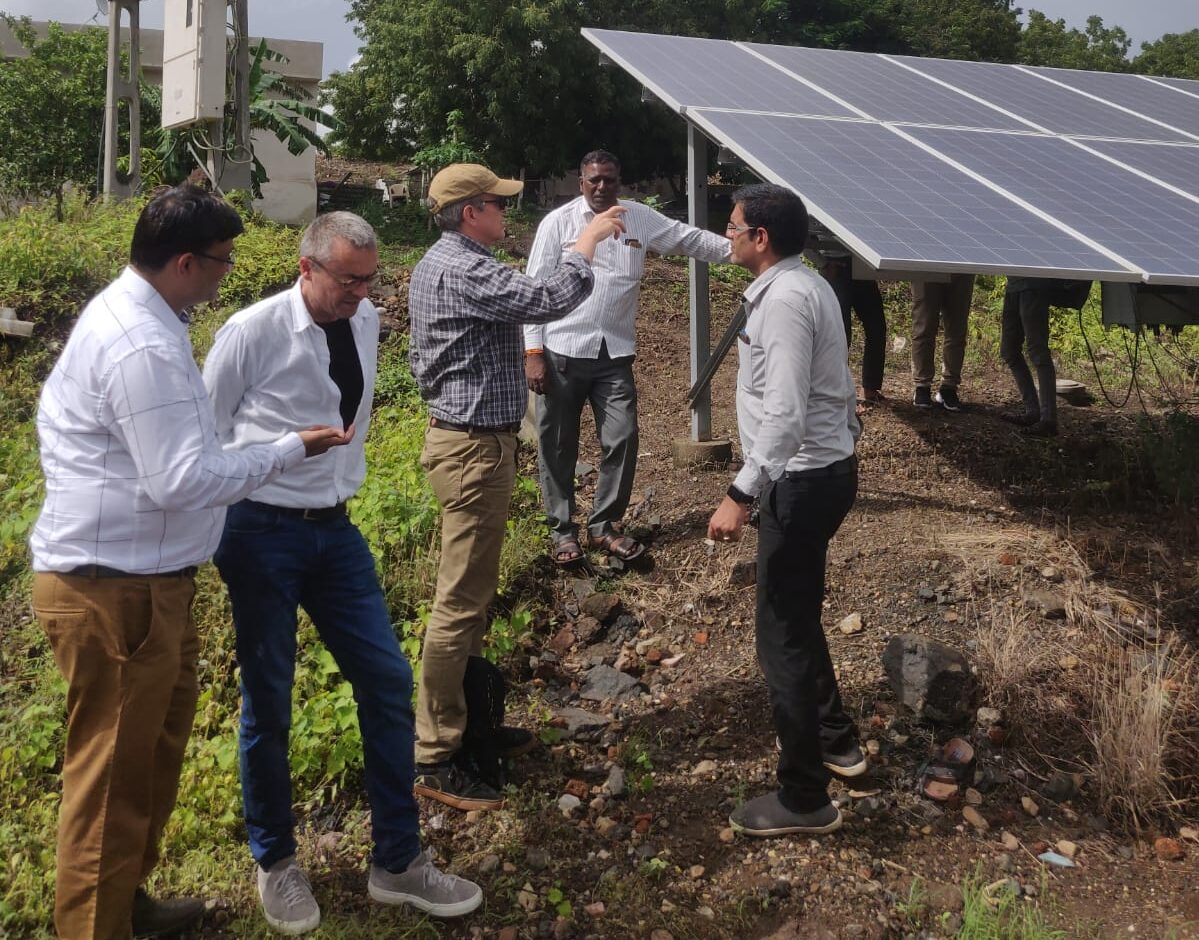 The Mid-term SoLAR project evaluation took place from 19 July to 12 August in Anand, Ahmedabad, Rajkot, Delhi, and Bangladesh to assess the outcomes and outputs of the project. Farmers from each DISCOM, regional researchers, research fellows, IF grantees, implementation country partners and officials, donor partners were involved in this comprehensive assessment by the external evaluation team.
The Mid-term SoLAR project evaluation took place from 19 July to 12 August in Anand, Ahmedabad, Rajkot, Delhi, and Bangladesh to assess the outcomes and outputs of the project. Farmers from each DISCOM, regional researchers, research fellows, IF grantees, implementation country partners and officials, donor partners were involved in this comprehensive assessment by the external evaluation team.
Chhipharmai-2 Rural Municipality Field Visit: Community interaction and capacity building in Nepal
The IWMI team of Amrita Rauniyar (Consultant) and Nabina Lamichhane (Consultant) visited Chhipharmai-2 rural municipality on August 5-6 to conduct meetings on community governance and institutional mechanism development. They asked farmers to get ready for capacity-building training and to document if there were any problems with the pump or system. The project is being implemented by IWMI Nepal and would need to be handed over to Saurya Urja Krishak Samuha (User Community) of Grid connected Solar irrigation pilot project under SoLAR. Hence, it was important to capacitate farmers to take the lead. This included preparing a list of roles (looking after grid-related problems, managing bank account, money collection, maintaining registers and minuting, etc.) and asking farmers to choose roles based on their knowledge and experience.
Model site showcasing effective utilization of solar pump: IWMI team visit Rawalpindi, Pakistan.
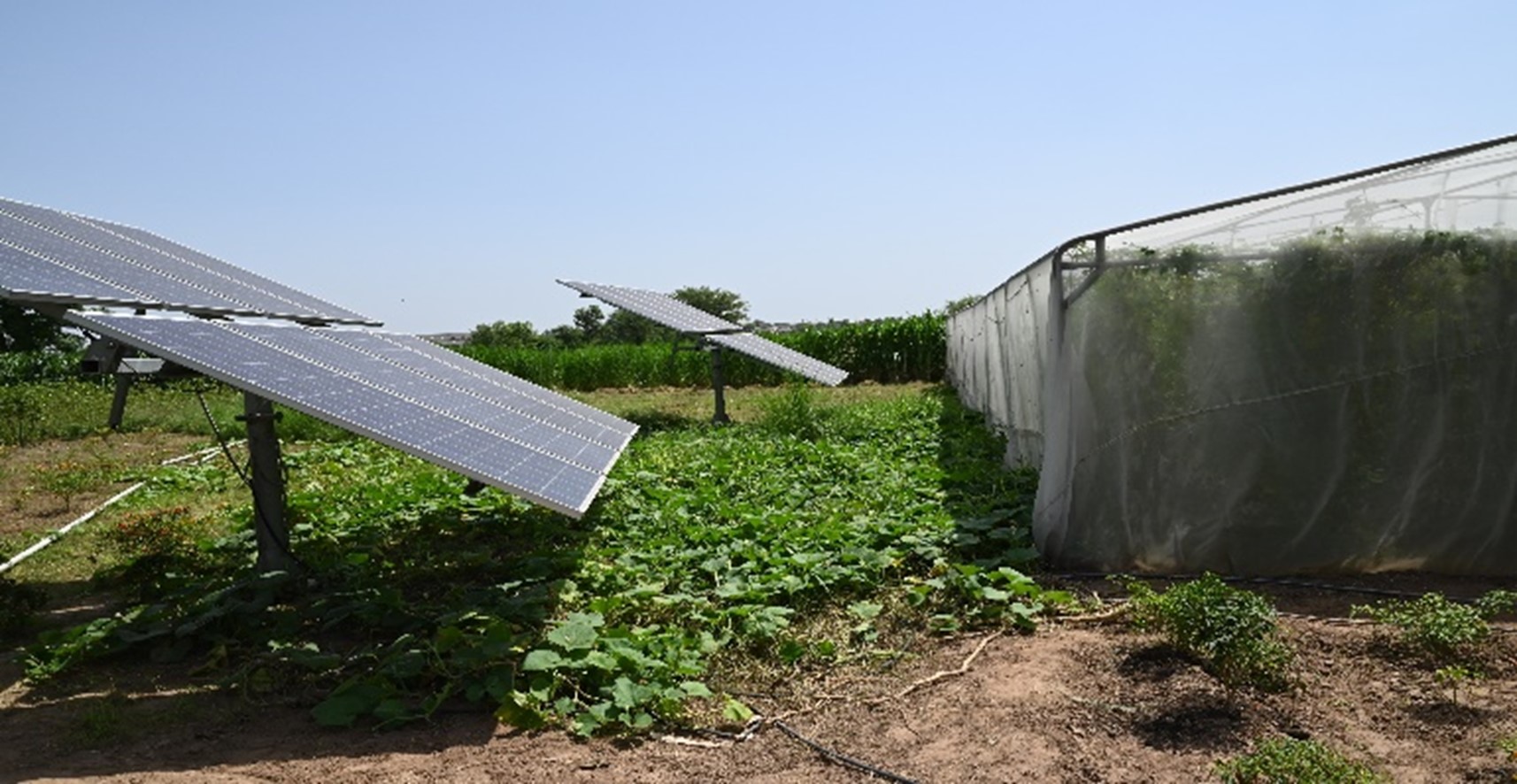 On August 29, 2023, the IWMI SoLAR team visited a model field site showcasing effective utilization of solar pumps for precision surface irrigation, drip irrigation, and tunnel farming in Saroba, Rawalpindi, Punjab. The site will be used for upcoming training on different uses of solar-installed equipment.
On August 29, 2023, the IWMI SoLAR team visited a model field site showcasing effective utilization of solar pumps for precision surface irrigation, drip irrigation, and tunnel farming in Saroba, Rawalpindi, Punjab. The site will be used for upcoming training on different uses of solar-installed equipment.
Meeting at PARC to discuss training of farmers and experts in Pakistan
The IWMI Solar team met Dr. Bashir Ahmad, Director PARC on August 22, 2023, to discuss modalities for conducting two separate training sessions for 25 female and 25 male farmers on the effective use of solar pumps for precision surface irrigation, drip irrigation, tunnel farming and alternative uses of solar installed equipment. Also, specialized training was provided to 25 water experts, technicians, and partners in the private sector on equipment standardization and selection procedures. Trial sites at PARC were visited post the meeting. Rice is being experimented with in different field configurations and irrigation methods i.e., RDI, drip, and flood irrigation. These trials were a part of the innovation fund activities.
Solarization of Agriculture is not a choice though it’s pace can be…
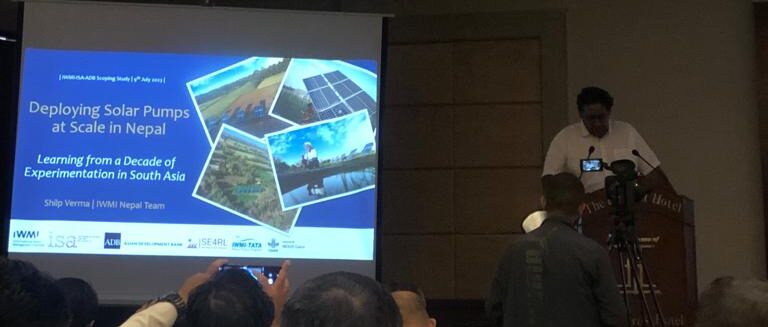
Shilp Verma from IWMI presented on the topic Deploying Solar Pumps at Scale in Nepal
Nepal became the official member of International Solar Alliance (ISA), and this workshop held on July 9, 2023, was one of the first events organized by ISA as part of the Technical Country Mission. One of the main objectives is engaging with stakeholders to generate awareness of ISA’s programmatic support to member countries, the ADB KSTA, planned activities, and promotion of solar irrigation. Shilp Verma from IWMI presented on the topic Deploying Solar Pumps at Scale in Nepal, learning from a decade of experimentation in South Asia. This was part of the IWMI-ISA-ADB Scoping Study. Verma outlined the statistics of sun being a plentiful resource with much of South Asia having 1,400-2,000 peak-hour equivalent sunshine which can be used to conservatively generate 3.8-5.6 kWh of energy per kWp of capacity installation and highlighted the solar-led transformation trajectories. He discussed the solar pump juggernaut in South Asia and highlighted that South Asia’s energy demand in agriculture is expected to grow by 84% by 2050. 97% of off-grid solar deployed for agriculture is in South Asia.
IWMI’s experimentation with Solar looks promising and determining attractive fit to spur farmer’s interest and investments will be critical and SPaRC might be easier to implement with fewer large-capacity pumps. The solar pump expansion drivers, bottlenecks, opportunities and challenges for Nepal were clearly laid out. The government was keen to solarize agriculture and multiple use solar systems can deliver reliable and affordable water for domestic and productive uses and that existing deep public tube wells in Terai can be solarized. However, some of the primary challenges were a need for more learning pilots to test business models and institutions, scarce subsidies and lack of O&M services ecosystem. A strong point was made regarding investments in solar pump ecosystem and that there is no one size fits all business model for Solar pumps and that the solarization of agriculture is not a choice though it’s pace can be.
Field visit in Terai (Madhesh Province) Chhipaharmai Rural Municipality Nepal and watershed conservation program site of Community Development & Advocacy Forum Nepal (CDAFN)

Photo: The Solar array of the SoLAR pilot site in Chhipaharmai Rural Municipality visited by Dr Mark Smith IWMI Director General
There was a field visit in Terai (Madhesh Province) on April 25-26, 2023, led by Dr Mark Smith IWMI Director General (DG) along with Dr Manohara Khadka (IWMI Nepal CR) and Mr Shisher Shrestha (National Researcher) and with the provincial authorities. The delegation visited the SoLAR Pilot site and interacted with the Local Government Chair and Farmer User groups. A meeting was held with the Chairperson and Chief Administrative Officer (CAO) of Chhipaharmai Rural Municipality on water challenges for local development. The team met with 8 farmers, 2 local government staff, and 1 person from the private sector during the field visit at Chhipaharmai Rural Municipality. Also, roundtable discussions took place on the various issues of water security and Transformative Futures for Water Security (TFWS). There was a field visit to the watershed conservation program site of the Community Development & Advocacy Forum Nepal (CDAFN) as part of the programme. The purpose of the visit was to observe IWMI’s interventions for action research that helped the DG get a better sense of the ground-level research activities.
A survey of farmers was carried out in Gujarat, India to evaluate the impact of the Suryashakti Kisan Yojana (SKY)
A comprehensive survey of farmers was carried out in Gujarat to evaluate the impact of the Suryashakti Kisan Yojana (SKY) on the agriculture sector. The survey commenced in February 2023 and concluded in July 2023. During this period, the survey team conducted surveys across three distinct categories of farmers: a) SKY-enrolled farmers, b) SKY-non-enrolled farmers, and c) non-SKY feeder farmers. The primary objective of this data collection endeavour was to assess the influence of SKY on the profitability of crops for these diverse groups of farmers.
Solar Country Project Lead visits NUST Energy Centre Team in Islamabad, Pakistan.
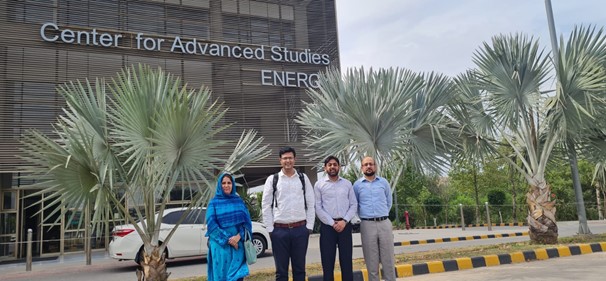 A meeting with the department Chair Dr. Adeel Waqas for the Centre of Advanced Studies in Energy, National University of Science and Technology (NUST) was held in Islamabad on May 23, 2023. NUST Energy Centre has been engaged by the Swiss Development Cooperation and Agency (SDC) for the review of the Pak component of the SoLAR-SDC project. The agenda for the meeting was to brief the Department Chair about the project activities and discuss areas of mutual interest. The NUST team included Dr. Kashif Imran, Associate Professor in Electrical Power Engineering, USPCASE NUST. Dr. Waqas gave a tour of the renewable energy labs and other facilities in their department. He promised full support for any future collaboration or use of facilities for training and capacity-building activities.
A meeting with the department Chair Dr. Adeel Waqas for the Centre of Advanced Studies in Energy, National University of Science and Technology (NUST) was held in Islamabad on May 23, 2023. NUST Energy Centre has been engaged by the Swiss Development Cooperation and Agency (SDC) for the review of the Pak component of the SoLAR-SDC project. The agenda for the meeting was to brief the Department Chair about the project activities and discuss areas of mutual interest. The NUST team included Dr. Kashif Imran, Associate Professor in Electrical Power Engineering, USPCASE NUST. Dr. Waqas gave a tour of the renewable energy labs and other facilities in their department. He promised full support for any future collaboration or use of facilities for training and capacity-building activities.
Training Farmers on Integrated Crop and Water Management in Bangladesh.
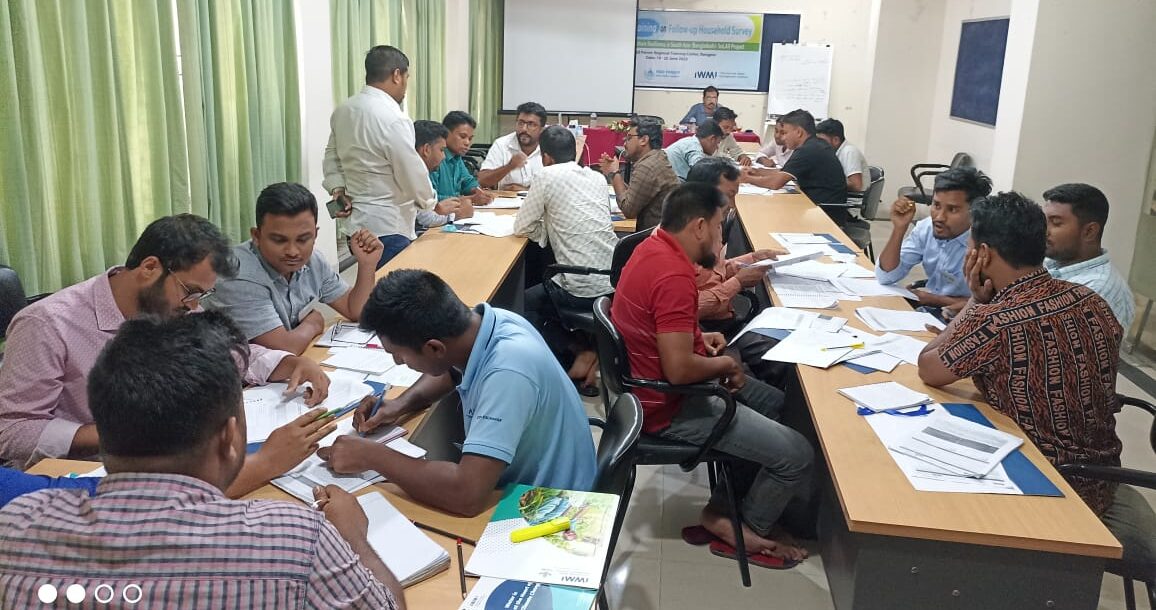 A farmers’ training was organised on June 13, 2023, in Kabilnagar Nasrul Ulum Fazil Madrasa, Upazila – Alamdanga, Chuadanga, district in Bangladesh. A total of 30 farmers benefitted from this training. The primary aim of the training was to enhance the capacity of SIP users in crop and water management to help boost their agricultural production This would help improve food security, augment farmers’ income, and raise livelihood for small landholders. The main objectives of the training are given below: a) to educate farmers about solar pumps and operational process; b) to spread knowledge about water-saving techniques and crop schedule; c) to spread advanced agricultural knowledge for boosting productivity; d) develop a platform for farmers to share their problems related to cultivation and mitigate the stated issues through sponsors e) to develop interlinkages between farmers and local government agricultural officials.
A farmers’ training was organised on June 13, 2023, in Kabilnagar Nasrul Ulum Fazil Madrasa, Upazila – Alamdanga, Chuadanga, district in Bangladesh. A total of 30 farmers benefitted from this training. The primary aim of the training was to enhance the capacity of SIP users in crop and water management to help boost their agricultural production This would help improve food security, augment farmers’ income, and raise livelihood for small landholders. The main objectives of the training are given below: a) to educate farmers about solar pumps and operational process; b) to spread knowledge about water-saving techniques and crop schedule; c) to spread advanced agricultural knowledge for boosting productivity; d) develop a platform for farmers to share their problems related to cultivation and mitigate the stated issues through sponsors e) to develop interlinkages between farmers and local government agricultural officials.
All updates>>

